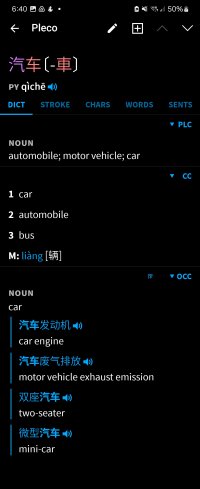TLDR:
I found some inconsistencies/missing entries of specific fields in HSK3.0 when I exported the Vocabulary Set.
Like:
Exported: 骑车[騎車] qi2che1 ride a bike
Pleco Entry:

Usually, there should be a "Part of a Sentence" like Noun, Verb, ... .
As a Reference:
Exported Row Entry: 孙女[孫女] sun1nü5 noun granddaughter
Pleco Entry:

--------------------------------------------------------------------------------------------------------------------------------------------------------
For the Nerds
Currently, I´m preparing my Anki Flash Card Set using the provided Definitions by Pleco HSK 3.0.
First, I exported ALL HSK3.0 Levels to a text file with the following settings:

By reverse engineering, I found the following structure:
[Hanzi] [Pinyin]
↻ [Part of Sentence] (colloquial) (Enumeration) [Meaning]
↻ ([Hanzi Example] [Pinyin Example] [Translation] (Alternative Translation)
Just for the notation not to make it complicated, [ ... ] is a necessary part of the definition, while ( ... ) is an optional part and ↻ indicates at least one or multiple elements. For reference, I formatted one entry of the text/csv file of 折:
折[折] zhe2 noun
1 discount; rebate
打八折 dǎ bā zhé give 20% discount; charge 80% of the original price
2 turning stroke
measure word
an act of zaju (杂剧)
verb
1 break; snap
折断腿 zhéduàn tuǐ fracture (or break) one’s leg
折断一根树枝 zhéduàn yī gēn shùzhī break off a branch
2 suffer the loss of; lose
损兵折将 sǔnbīng-zhéjiàng suffer heavy losses
3 bend; twist
曲折 qūzhé twists and turns
4 turn back; change direction
边界由此折向西南。 Biānjiè yóucǐ zhé xiàng xīnán. From here the boundary turns southwestward.
5 convinced; filled with admiration
心折 xīnzhé deeply convinced; filled with heartfelt admiration
6 convert into; amount to
把市斤折成公斤 bǎ shìjīn zhé chéng gōngjīn convert (or change) jin into kilograms
笔外币折成人民币是多少? Zhè bǐ wàibì zhé chéng rénmínbì shì duōshao? How much does this foreign exchange convert into Renminbi?
noun
folded booklet with a slipcase, used for keeping accounts, etc.; folder
存折 cúnzhé account book verb fold 把信折好 bǎ xìn zhé hǎo fold the letter 把纸对折起来 bǎ zhǐ duìzhé qǐlai fold the sheet of paper in two
When I filter for "Part of a Sentence", a lot of entries do not match the [Hanzi] [Pinyin] [Part of Sentence], which makes it hard for me to import them correctly to Anki/other Tools, because there should be another tab space (e.g. 4 space characters) to identify an missing entry [Part of Sentence]:
For Instance:
总是[總是] zong3shi4 always
Should be (by my understanding):
总是[總是] zong3shi4 always
This does not happen with small friction of entries, but rather with larger numbers that take a long time to correct by hand.
Did I do something wrong? Is this behavior wanted?
Thanks in advance
I found some inconsistencies/missing entries of specific fields in HSK3.0 when I exported the Vocabulary Set.
Like:
Exported: 骑车[騎車] qi2che1 ride a bike
Pleco Entry:
Usually, there should be a "Part of a Sentence" like Noun, Verb, ... .
As a Reference:
Exported Row Entry: 孙女[孫女] sun1nü5 noun granddaughter
Pleco Entry:
--------------------------------------------------------------------------------------------------------------------------------------------------------
For the Nerds
Currently, I´m preparing my Anki Flash Card Set using the provided Definitions by Pleco HSK 3.0.
First, I exported ALL HSK3.0 Levels to a text file with the following settings:
By reverse engineering, I found the following structure:
[Hanzi] [Pinyin]
↻ [Part of Sentence] (colloquial) (Enumeration) [Meaning]
↻ ([Hanzi Example] [Pinyin Example] [Translation] (Alternative Translation)
Just for the notation not to make it complicated, [ ... ] is a necessary part of the definition, while ( ... ) is an optional part and ↻ indicates at least one or multiple elements. For reference, I formatted one entry of the text/csv file of 折:
折[折] zhe2 noun
1 discount; rebate
打八折 dǎ bā zhé give 20% discount; charge 80% of the original price
2 turning stroke
measure word
an act of zaju (杂剧)
verb
1 break; snap
折断腿 zhéduàn tuǐ fracture (or break) one’s leg
折断一根树枝 zhéduàn yī gēn shùzhī break off a branch
2 suffer the loss of; lose
损兵折将 sǔnbīng-zhéjiàng suffer heavy losses
3 bend; twist
曲折 qūzhé twists and turns
4 turn back; change direction
边界由此折向西南。 Biānjiè yóucǐ zhé xiàng xīnán. From here the boundary turns southwestward.
5 convinced; filled with admiration
心折 xīnzhé deeply convinced; filled with heartfelt admiration
6 convert into; amount to
把市斤折成公斤 bǎ shìjīn zhé chéng gōngjīn convert (or change) jin into kilograms
笔外币折成人民币是多少? Zhè bǐ wàibì zhé chéng rénmínbì shì duōshao? How much does this foreign exchange convert into Renminbi?
noun
folded booklet with a slipcase, used for keeping accounts, etc.; folder
存折 cúnzhé account book verb fold 把信折好 bǎ xìn zhé hǎo fold the letter 把纸对折起来 bǎ zhǐ duìzhé qǐlai fold the sheet of paper in two
When I filter for "Part of a Sentence", a lot of entries do not match the [Hanzi] [Pinyin] [Part of Sentence], which makes it hard for me to import them correctly to Anki/other Tools, because there should be another tab space (e.g. 4 space characters) to identify an missing entry [Part of Sentence]:
For Instance:
总是[總是] zong3shi4 always
Should be (by my understanding):
总是[總是] zong3shi4 always
This does not happen with small friction of entries, but rather with larger numbers that take a long time to correct by hand.
Did I do something wrong? Is this behavior wanted?
Thanks in advance

